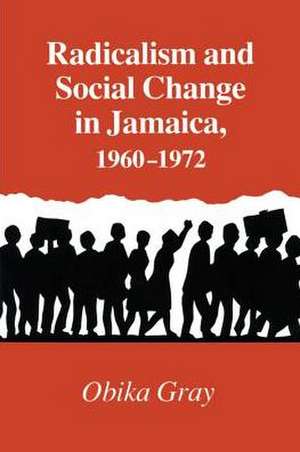Radicalism and Social Change in Jamaica: 1960-1972
Autor Obika Grayen Limba Engleză Paperback – 30 aug 2007
Led by a minority elite and a middle class of mixed racial origins, two parties, each with its associated workers’ union, emerged to dominate the postcolonial political scene. Gray argues that party leaders, representing the dominant social class, felt vulnerable to attack and resorted to dictatorial measures to consolidate their power. These measures, domestic social crises, and the worldwide rise of Black Power and other Third World ideologies provoked persistent challenges to the established parties’ political and moral authority. With students, radical intellectuals, and the militant urban poor in the vanguard, the protest movement took many forms. Rastafarian religious symbolism, rebel youth’s cultural innovations, efforts to organize independent labor unions, and the intelligentsia’s varied attempts to use mass media to reach broader audiences—all influenced the course of political events in this period. Grounding his tale in relevant theory, Gray persuasively contends that, despite its narrow social and geographical base of support, this urban protest movement succeeded in moving the major parties toward broader
and more progressive agendas.
Preț: 204.08 lei
Nou
Puncte Express: 306
Preț estimativ în valută:
39.06€ • 40.35$ • 32.50£
39.06€ • 40.35$ • 32.50£
Carte tipărită la comandă
Livrare economică 26 martie-09 aprilie
Preluare comenzi: 021 569.72.76
Specificații
ISBN-13: 9780870496615
ISBN-10: 0870496611
Pagini: 304
Dimensiuni: 152 x 229 x 25 mm
Greutate: 0.44 kg
Ediția:First Edition, First Edition
Editura: University of Tennessee Press
Colecția Univ Tennessee Press
ISBN-10: 0870496611
Pagini: 304
Dimensiuni: 152 x 229 x 25 mm
Greutate: 0.44 kg
Ediția:First Edition, First Edition
Editura: University of Tennessee Press
Colecția Univ Tennessee Press
Notă biografică
Obika Gray is a political scientist who teaches at the University of Wisconsin–Eau Claire.
